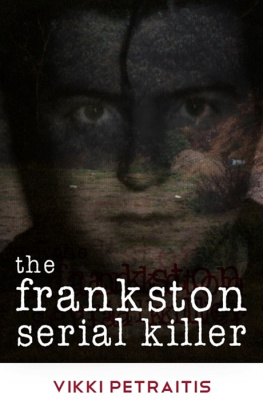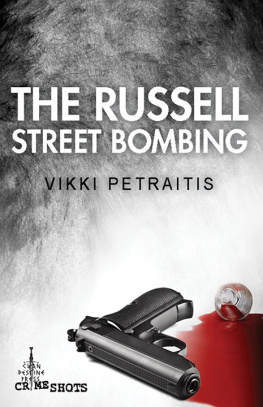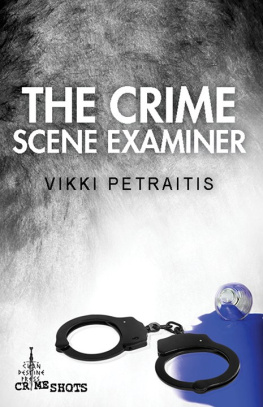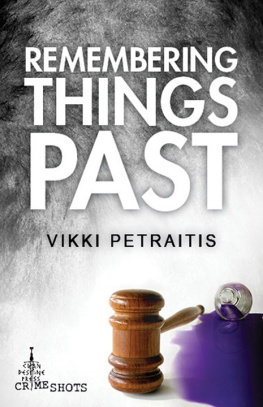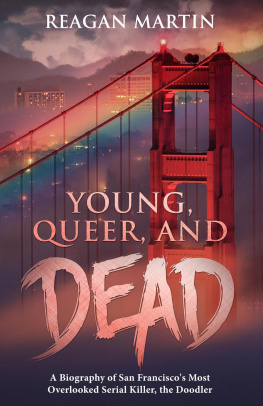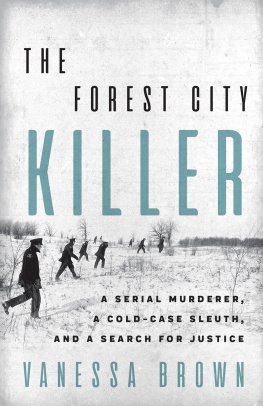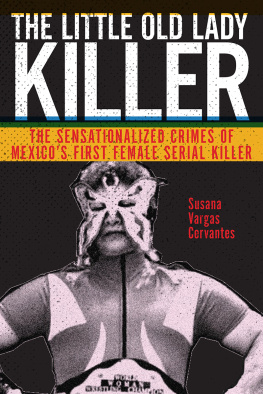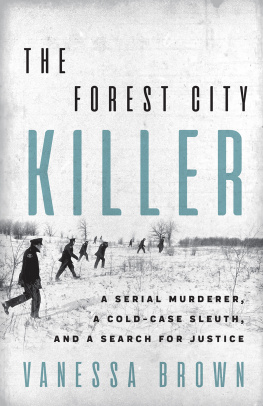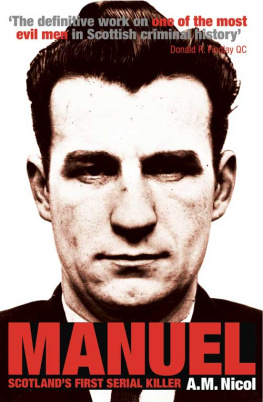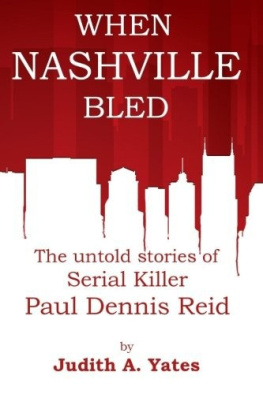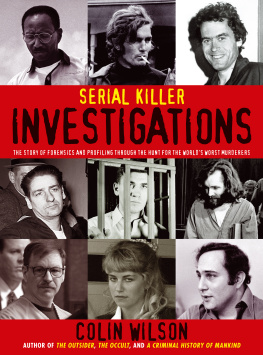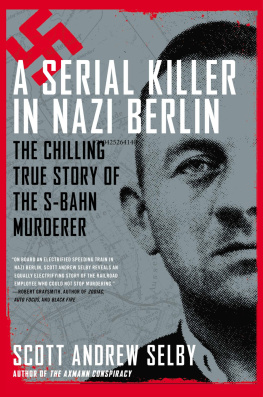Vikki Petraitis - The Frankston Serial Killer
Here you can read online Vikki Petraitis - The Frankston Serial Killer full text of the book (entire story) in english for free. Download pdf and epub, get meaning, cover and reviews about this ebook. year: 2012, publisher: Dennis Jones & Associates Pty Ltd;Clan Destine Press, genre: Detective and thriller. Description of the work, (preface) as well as reviews are available. Best literature library LitArk.com created for fans of good reading and offers a wide selection of genres:
Romance novel
Science fiction
Adventure
Detective
Science
History
Home and family
Prose
Art
Politics
Computer
Non-fiction
Religion
Business
Children
Humor
Choose a favorite category and find really read worthwhile books. Enjoy immersion in the world of imagination, feel the emotions of the characters or learn something new for yourself, make an fascinating discovery.
- Book:The Frankston Serial Killer
- Author:
- Publisher:Dennis Jones & Associates Pty Ltd;Clan Destine Press
- Genre:
- Year:2012
- Rating:4 / 5
- Favourites:Add to favourites
- Your mark:
- 80
- 1
- 2
- 3
- 4
- 5
The Frankston Serial Killer: summary, description and annotation
We offer to read an annotation, description, summary or preface (depends on what the author of the book "The Frankston Serial Killer" wrote himself). If you haven't found the necessary information about the book — write in the comments, we will try to find it.
In 1993, the unthinkable happeneda serial killer began killing young women on the streets around Frankston. Read the incredible story about the hunt and capture of Paul Denyer, the 21-year-old responsible, and the lives that were ruined as a result of his crimes.
The Frankston Serial Killer — read online for free the complete book (whole text) full work
Below is the text of the book, divided by pages. System saving the place of the last page read, allows you to conveniently read the book "The Frankston Serial Killer" online for free, without having to search again every time where you left off. Put a bookmark, and you can go to the page where you finished reading at any time.
Font size:
Interval:
Bookmark:
In 1993, the unthinkable happened - a serial killer began killing young women on the streets around Frankston. Read the incredible story about the hunt and capture of Paul Denyer, the 21-year-old responsible, and the lives that were ruined as a result of his crimes.
This book is dedicated to
the memory of:
Elizabeth Ann-Marie Stevens
Deborah Ann Fream
Natalie Jayne Russell
I began writing The Frankston Murders back in 1993 when people living in the bayside suburbs were terrified because we had a serial killer in our midst. At that time, I had written my first book called The Phillip Island Murder and was working on my second true-crime book which was a collection of short stories from different areas of the police force. I had spent quite a bit of time with the police at Frankston gathering material. One afternoon, I was scheduled to meet with police officers from the community policing squad.
I remember walking into a solemn office where most of the talk was taken up with concerns for a missing mother of a newborn baby. The woman, Debbie Fream, had been cooking dinner for a friend when she had driven up to the local shops to buy milk. From there, she had vanished. At that stage, it was a community policing squad issue, because the only thing that made any sense was that Debbie must have suffered some kind of post-natal depression and taken herself off somewhere. Young mothers didn't vanish off the face of the earth.
Talk in the squad rooms of the community policing squad had taken a worrying turn because Debbie's car had been discovered near a local hall of worship with the driver's seat pushed right back. Debbie was short and drove with the seat pushed forward. Had someone taken her and then driven her car? Adding to the growing concern were reports that drivers along the Frankston Dandenong Road had seen a car similar to Debbie's flashing its headlights at oncoming cars around the time she disappeared.
After an anxious four-day wait, Debbie's body was found dumped on a remote road at the back of Carrum Downs. Her murder was linked with the earlier murder of 18-year-old Elizabeth Stevens and other murders in the Frankston area over the previous years.
It didn't take long for newspaper headlines to start screaming that Frankston had a serial killer and people started to panic. I lived a couple of suburbs down and witnessed the panic like everyone else. Detectives in long dark coats knocked on our doors asking if we'd noticed anything odd, seen anything that could help. Police flooded into the area, transferred from duties elsewhere on the hunt for the serial killer.
Finally came the night that I knew I had to write this book. I was doing a police ride-along with a sergeant in Frankston and we arrived for the nightshift around 10.30pm. We were met at the back gate by the group of stalwart smokers puffing away under the spot light at the back door of the big new police station.
'Another one's gone missing,' one of the cops told us.
'Right under our bloody noses,' said another, shaking his head hopelessly.
'What kind of girl is she?' asked the sergeant.
It was a question that would make every feminist shudder; as if the kind of girl made a difference. I soon realised, though, that the question was in fact cop-speak for whether she was a likely run-away or not.
The answer? 'Nah, she's a good kid. Just never came home from school.'
Not long after we entered the police complex, news came of a body found off a pathway between two Frankston golf courses.
And so it was that I found myself alone in the backseat of a police car, in the car park of the school that adjoined the track where the body had been found. I stayed there taking notes while the low-flying police helicopter shone its night-sun over where the body lay. In the small hours of the morning, I sat with my notebook, watching the shadowy police officers doing what they do, wondering about this man who seemed uncatchable. Where was he now? Was he gloating? Was he watching the news for glimpses of the carnage he had caused; laughing at the cops who couldn't catch him?
How many more women would die before they caught him?
When the police finally returned to the car to head back to the police station, the sergeant warned me that I couldn't use the notes I had taken, or talk to the press. When they caught the bastard, everything had to be done by the book.
Sure, I said. I wasn't a journalist; I didn't want to race my notes off to the nearest newspaper anyway. I was a true crime author and if this story was written, it would need more than just headline-grabbing prose. It would need to be measured and tell a bigger story. It would need to talk about not only what the serial killer did, but about what he took from us. It would need to explore the aftermath of such a killing spree on the families affected and the community.
And so after the key clanged on the killer's jail cell, I set about documenting the events as thoroughly as I could. The result was this story.
What do we get from looking at cases like this? What can we learn about ourselves and our community? For one thing, an atrocity like the Frankston murders is always counter-balanced by the community response. While nothing replaces what Denyer took, and nothing repairs the families who were forever altered with loss, the community spirit swells when it is needed, both in support and in the voice of outcry against the justice system which didn't seem to recognise that a 30-year minimum sentence just wasn't enough.
Another thing we learn from a close examination of Paul Denyer is that there are some people in our community who do not operate with the same sense of right and wrong as we do.
Some people just don't get it; they are not on the same wave-length as everybody else. At no time did Denyer indicate remorse or regret for what he had done. It would appear that he is incapable of such feelings.
I remember chatting to a man at a talk I gave after this book was first published. He told me that his wife felt guilty about Natalie Russell's death because they knew the Russell family, and his wife would sometimes give Natalie a ride home from school. On the day Denyer murdered Natalie, the wife had been caught up and didn't drive past at the normal time. While the man was telling me this, it suddenly occurred to me that so many people felt guilty about all the victims.
If only, they thought. If only I had picked Natalie up; if only Debbie had remembered to buy milk earlier; if only Elizabeth had caught a different bus; if only
Ironically, the only person who didn't feel guilt, was the only person who should have, Paul Denyer.
And lastly, perhaps the Denyer case has taught us that we need to rethink laws about serial killers. They are a danger to society and all studies indicate they are incurable. Denyer was granted a 30-year minimum sentence because he hadn't offended before. Aside from petty crimes, this is pretty standard for serial killers and needs to be recognised in sentencing. And even if thirty years sounded like a long time back in 1993 when Denyer was sentenced, in 2011 he only has another twelve to serve before he can start applying for parole.
It's certainly something to think about.
Vikki Petraitis
2011
In late February 1993, a young man called Paul began working at a Seaford boat-building firm, Pro Marine, doing general clean up duties as part of a government employment scheme. Being a big man, over six feet tall and around sixteen stone, Paul quickly earned the nickname 'John Candy' after the overweight Canadian actor.
Paul had worked at Pro Marine for only a couple of weeks before his co-worker, Jason, noticed something odd about him. One morning, he walked into the store room and saw Paul standing in the corner near the paint shelves. His back was towards Jason, but the young man could see that Paul was fiddling with something. When he turned around, Jason quickly went to another shelf and pretended to look for something. Without a word, Paul abruptly walked out of the store room.
Font size:
Interval:
Bookmark:
Similar books «The Frankston Serial Killer»
Look at similar books to The Frankston Serial Killer. We have selected literature similar in name and meaning in the hope of providing readers with more options to find new, interesting, not yet read works.
Discussion, reviews of the book The Frankston Serial Killer and just readers' own opinions. Leave your comments, write what you think about the work, its meaning or the main characters. Specify what exactly you liked and what you didn't like, and why you think so.

